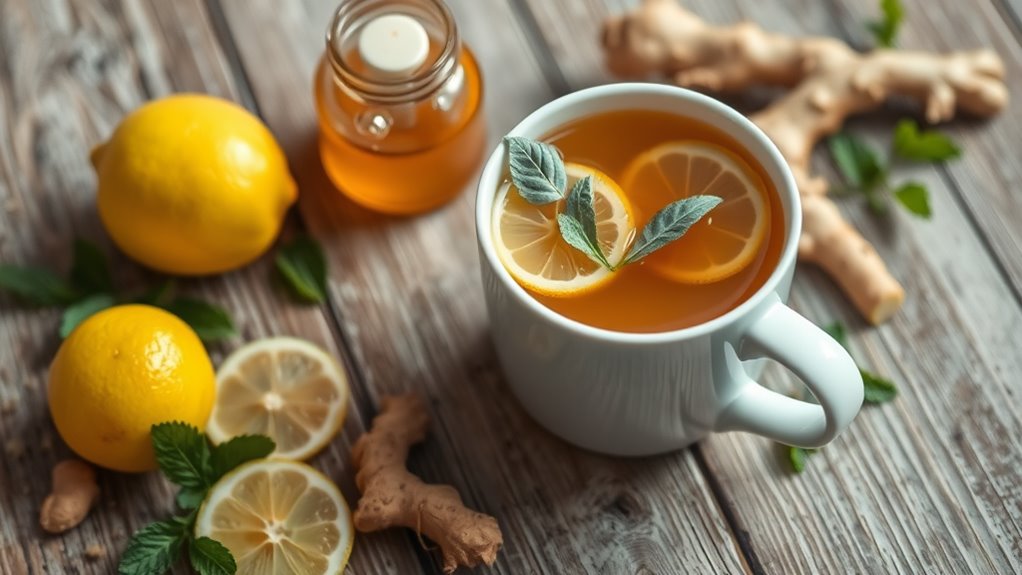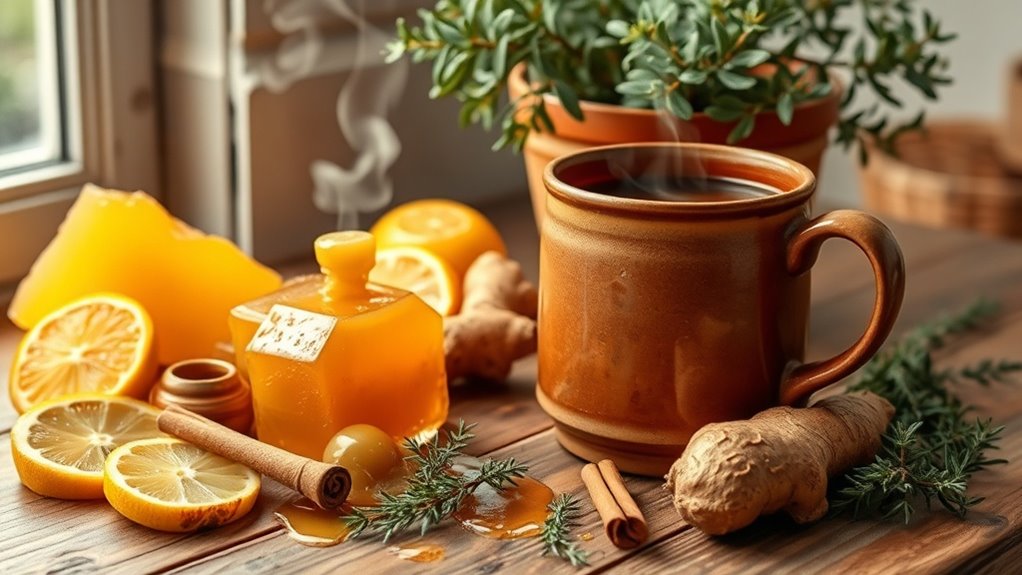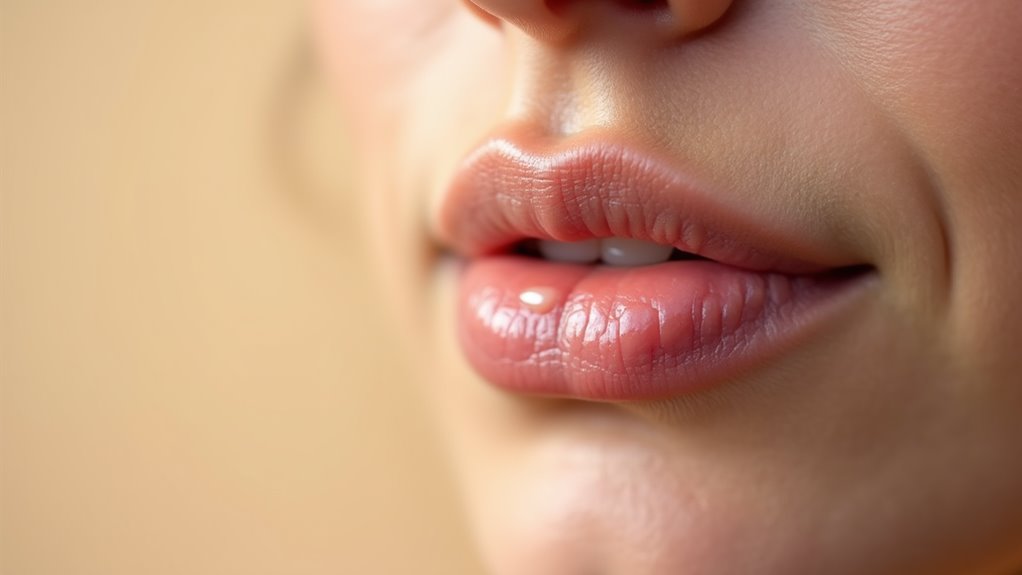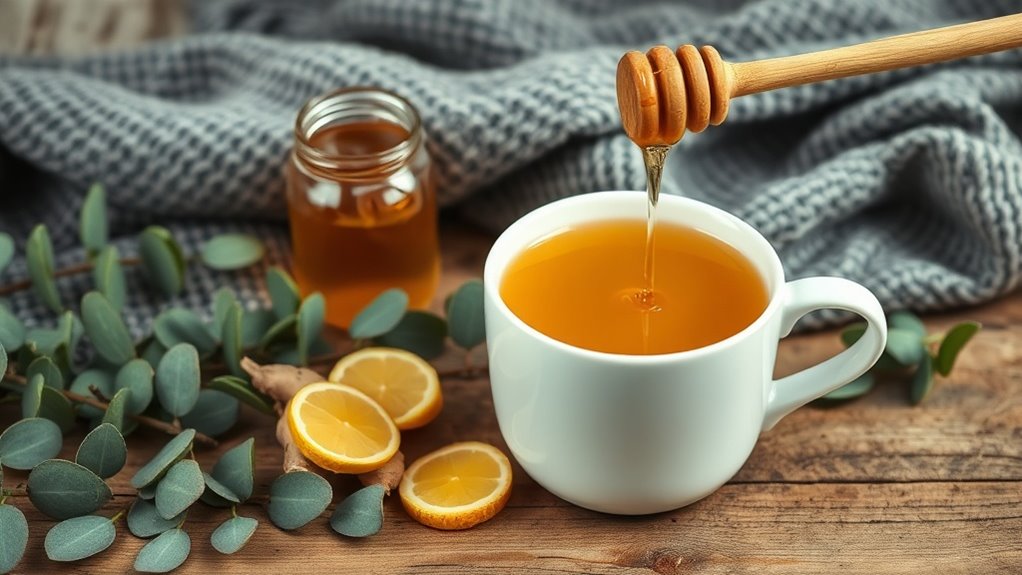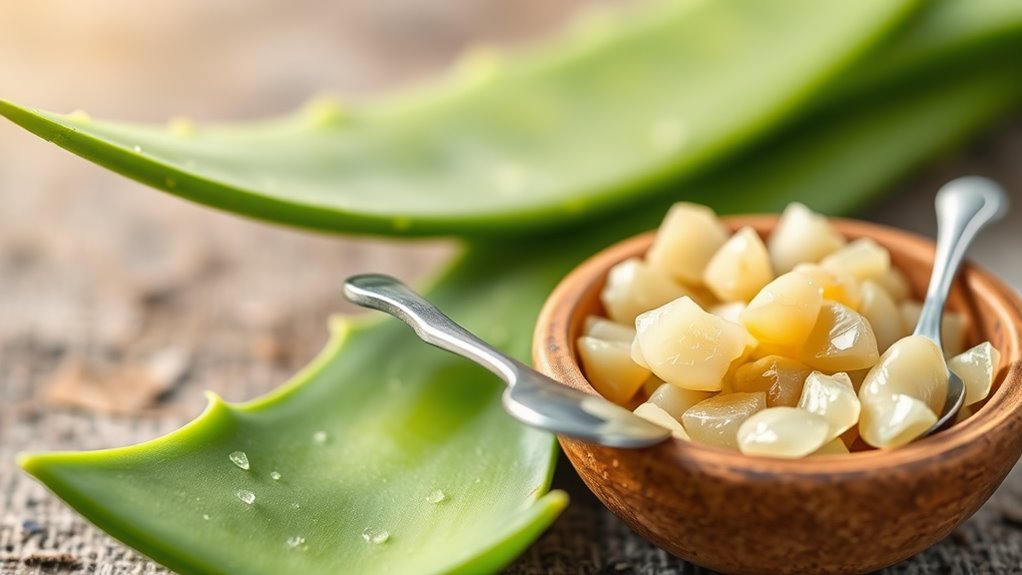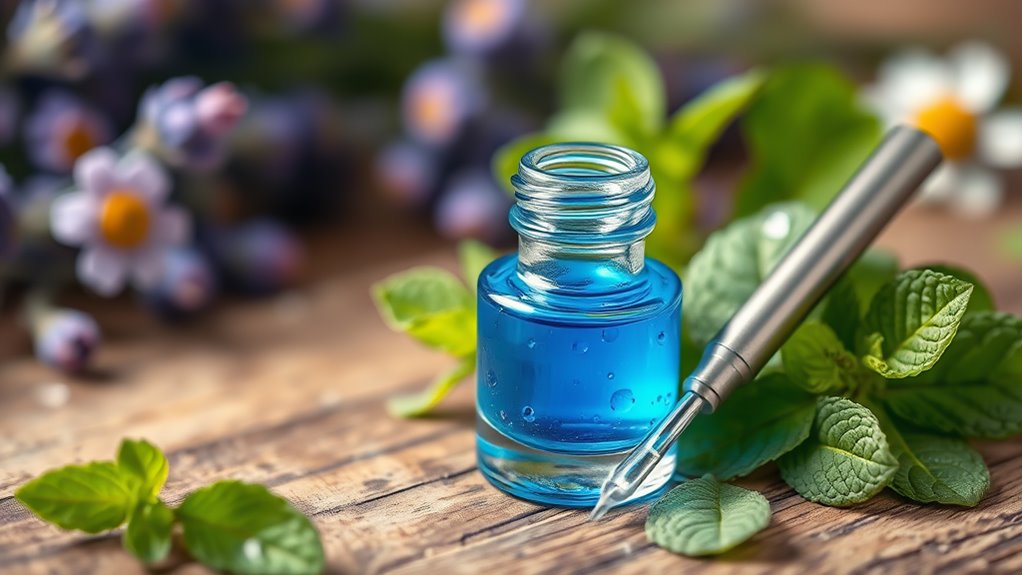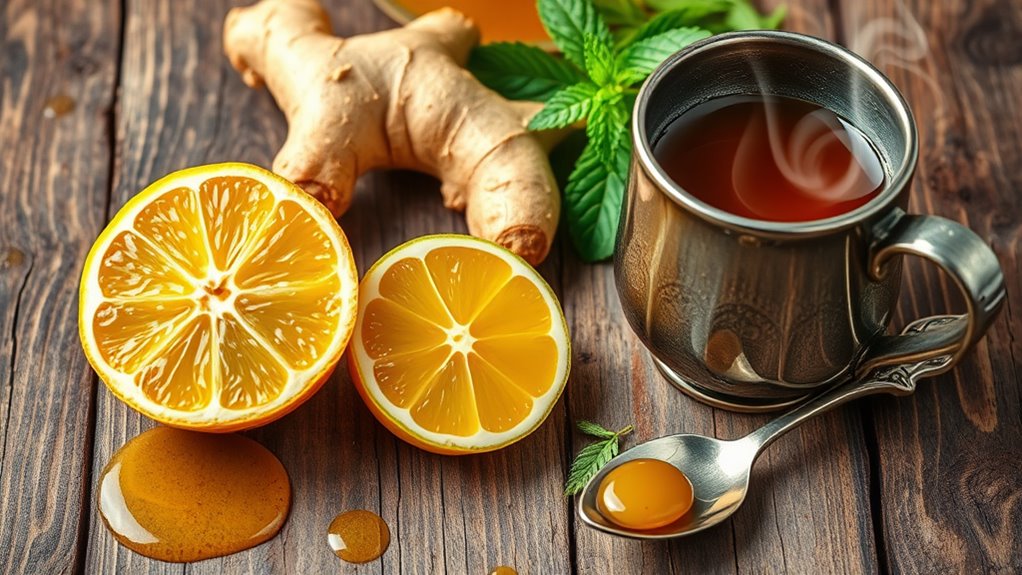Natural Mucus Relief Remedies for a Clearer Chest
You’ll find quick relief from chest congestion through proven natural remedies. Start by increasing your fluid intake with water and herbal teas to thin mucus, then combine this with steam therapy using eucalyptus oil for enhanced breathing. Add anti-inflammatory foods like ginger and turmeric to your diet, while incorporating deep breathing exercises. These foundational steps lay the groundwork for exploring more advanced mucus-clearing techniques.
Understanding Chest Mucus and Its Causes
Have you ever wondered why your body produces chest mucus?
It’s actually a protective mechanism your respiratory system uses to trap harmful particles like dust and bacteria. Increased mucus production during illness is a normal response as the body works to expel unwanted invaders. While clear, thin mucus is normal and beneficial, thicker mucus can signal underlying problems that may require mucus relief remedies.
Common causes include infections like colds and bronchitis, allergies, asthma, and acid reflux. Smoking greatly increases mucus production through lung irritation. The color and consistency of mucus can be an important status indicator of your body’s health. Chronic conditions such as COPD, cystic fibrosis, and chronic sinusitis can also trigger excessive mucus.
When mucus builds up, you might experience coughing, chest congestion, wheezing, and breathing difficulties, which can be alleviated through natural remedies that support respiratory health.
Essential Hydration and Steam Therapy Methods
When battling chest congestion, proper hydration and steam therapy serve as fundamental remedies for thinning mucus and easing respiratory discomfort. You’ll need to increase your fluid intake with water, hot tea, and broth-based soups to help thin mucus effectively. Adding lemon and honey to your beverages can significantly reduce cough frequency while supporting recovery. Additionally, maintaining adequate hydration is crucial for preventing excess mucus production.
| Method | Application | Benefits |
|---|---|---|
| Steam Therapy | Hot shower or bowl of water | Loosens mucus, opens airways |
| Humidifier | Cool-mist overnight | Maintains airway moisture |
| Eucalyptus Steam | Add oil to hot water | Enhanced mucus thinning |
Combine these methods with adequate rest to support your immune system’s fight against congestion. Remember to stay consistent with hydration throughout the day while using steam therapy intermittently for best relief.
Powerful Herbal Remedies and Essential Oils
Natural herbs and essential oils provide powerful relief for stubborn mucus and respiratory congestion.
You’ll find ginger and peppermint particularly effective at thinning mucus and reducing inflammation, while eucalyptus helps loosen chest congestion. Kitchen herbs like thyme can also support respiratory health and enhance overall wellness.
Consider combining remedies for enhanced benefits – try ginger tea with eucalyptus oil inhalation or peppermint tea with frankincense oil. Using a cool mist humidifier alongside these remedies helps maintain optimal moisture levels for respiratory comfort.
Before using these remedies, check for potential allergies or medication interactions.
If you’re pregnant or nursing, consult your healthcare provider first.
For best results, use echinacea to boost immunity, licorice root as an expectorant, and rosemary oil to improve respiratory function.
Effective Dietary Changes for Mucus Control
Your diet’s anti-inflammatory foods play a vital role in managing excess mucus, with options like garlic, onions, and omega-3-rich fish helping to reduce inflammation naturally. Incorporating natural remedies such as raw honey and ginger can further enhance your mucus control efforts. Fresh produce not only provides essential nutrients but also contributes to proper hydration levels, which can help thin and mobilize thick mucus. Natural spices such as ginger, turmeric, and cayenne pepper act as powerful mucus-thinning agents while supporting your respiratory system’s ability to clear congestion effectively. Studies show that warm herbal teas provide significant relief by soothing throat irritation and helping clear excess mucus.
Anti-Inflammatory Foods Matter
Making strategic dietary changes can greatly impact mucus production and inflammation throughout the body.
Research shows that specific anti-inflammatory foods can help reduce excess mucus and support respiratory health.
The microbial ecosystem balance in your gut significantly influences inflammation and mucus regulation throughout the body.
Your diet plays a vital role in managing mucus levels naturally.
- Incorporate garlic into meals for its allicin content, which provides antimicrobial and anti-inflammatory benefits
- Add turmeric to dishes to reduce lung inflammation and prevent excess mucus formation
- Consume omega-3 rich fish oil to decrease inflammatory cell infiltrates in lung tissue
- Include citrus fruits for their natural decongestant properties and vitamin C content
- Avoid processed foods with artificial sweeteners that can trigger increased mucus production
Hydration Through Fresh Produce
When seeking relief from excess mucus, proper hydration through fresh produce offers a powerful dietary solution.
You’ll find the highest water content in cucumbers, celery, and leafy greens, with cucumbers containing over 95% water.
These foods directly support mucociliary clearance, your body’s natural mechanism for expelling mucus.
Citrus fruits work as natural decongestants while providing immune-boosting vitamin C.
Adding a splash of lemon or lime in warm water enhances hydration and helps expel mucus naturally.
Complement these with quercetin-rich foods like grapes, berries, and onions to reduce mucus production.
For best results, incorporate raw fruits and vegetables throughout your day, as they’ll help maintain fluid balance and prevent the formation of thick, sticky mucus.
Spices Combat Thick Mucus
Spices offer powerful solutions for combating thick mucus through their bioactive compounds and natural therapeutic properties.
Capsaicin, found in chili peppers and cayenne, effectively breaks down mucus while stimulating its clearance from your respiratory system. The bronchial epithelium cells naturally produce protective mucus that these spices help regulate and clear.
- Add mild amounts of chili peppers to soups and broths for enhanced mucus-fighting benefits
- Incorporate ginger to reduce inflammation and soothe your throat
- Use cayenne pepper for its potent antioxidant and mucus-thinning properties
- Include garlic and onions to leverage their anti-inflammatory effects
- Combine spices with hot liquids to maximize their mucus-breaking potential
These spices work by binding to pain receptors, triggering increased mucus flow and vasodilation for better respiratory relief.
Simple At-Home Physical Techniques
The management of excess mucus can be effectively addressed through several physical techniques you can perform at home. These methods combine breathing exercises, controlled coughing, and strategic positioning to help clear your airways naturally.
| Technique | Method | Benefit |
|---|---|---|
| Deep Breathing | Inhale slowly, expand chest | Loosens mucus |
| Pursed Lip | Exhale through pursed lips | Keeps airways open |
| Postural Drainage | Lie at 30° angle | Uses gravity for drainage |
| Steam Inhalation | Breathe warm, moist air | Thins mucus deposits |
Incorporate these techniques into your daily routine, focusing on proper form and gentle progression. Additionally, using steam therapy can enhance the effectiveness of these methods, especially during sleep when mucus tends to accumulate. Combine with humidification methods for best results, especially during sleep when mucus tends to accumulate.
Lifestyle Adjustments for Better Breathing
Making strategic lifestyle adjustments can greatly improve your breathing and reduce excess mucus production.
Focus on implementing these evidence-based changes to support your respiratory health:
- Practice slow, controlled breathing techniques like diaphragmatic and pursed-lip breathing to enhance lung efficiency.
- Engage in regular low-impact exercises such as walking or swimming to strengthen respiratory muscles.
- Maintain a healthy weight through balanced nutrition and physical activity to reduce strain on your lungs.
- Quit smoking and avoid secondhand smoke exposure to prevent airway inflammation.
- Incorporate stress-reduction techniques like meditation to promote effective breathing patterns. Additionally, consider practicing 4-7-8 breathing to activate the body’s relaxation response and improve overall respiratory function.
When to Combine Natural and Medical Solutions
You’ll find that combining natural remedies with medical treatments can provide thorough relief from stubborn mucus buildup.
Your decision to add medical interventions should align with the severity of your symptoms and any underlying health conditions that require professional attention.
When natural remedies alone don’t deliver sufficient relief, it’s time to evaluate over-the-counter expectorants or prescription medications while maintaining beneficial natural practices. Always consider the risks of OTC medications that may complicate your recovery.
Best of Both Worlds
When seeking effective mucus relief, combining natural remedies with medical solutions can provide more thorough treatment than using either approach alone.
Consider these evidence-based combinations:
- Pair over-the-counter expectorants with increased fluid intake to enhance mucus clearance
- Use ginger or holy basil tea alongside steam inhalation with eucalyptus oil
- Combine saline nasal rinses with natural expectorants like garlic and honey
- Run a humidifier while taking medical expectorants to maintain ideal moisture levels
- Incorporate hydrating foods and drinks while using medical treatments for enhanced effectiveness
Always consult your healthcare provider before combining treatments, especially if you’re pregnant or have underlying conditions.
Timing Medical Intervention Right
Recognizing the right moment to switch from natural remedies to medical intervention can greatly impact your recovery from mucus-related issues.
You’ll need immediate medical care if you develop a fever over 100.4°F, experience breathing difficulties, or notice bluish discoloration of your lips or fingertips.
Watch for coughs producing bloody mucus, chest pain that radiates, or symptoms persisting beyond three weeks.
If you have preexisting conditions like asthma, COPD, or a weakened immune system, seek medical help sooner.
Don’t wait when natural remedies aren’t providing relief after several days or if your mucus changes color and consistency.
References
- https://www.healthline.com/health/how-to-get-rid-of-mucus-in-chest
- https://www.medicalnewstoday.com/articles/321134
- https://medisyshealth.org/newsletter/7-home-remedies-to-relieve-chest-congestion/
- https://delsym.com/blogs/resources/home-remedies-for-chest-congestion-symptoms
- https://www.verywellhealth.com/home-remedies-for-chest-congestion-5179700
- https://my.clevelandclinic.org/health/symptoms/24636-coughing-up-phlegm
- https://www.webmd.com/covid/mucus-in-chest-overview
- https://my.clevelandclinic.org/health/symptoms/chest-congestion
- https://www.mayoclinic.org/diseases-conditions/bronchitis/symptoms-causes/syc-20355566
- https://vicks.com/en-us/treatments/how-to-treat-sinus-and-nasal-congestion/what-is-chest-congestion-causes-symptoms-treatment

